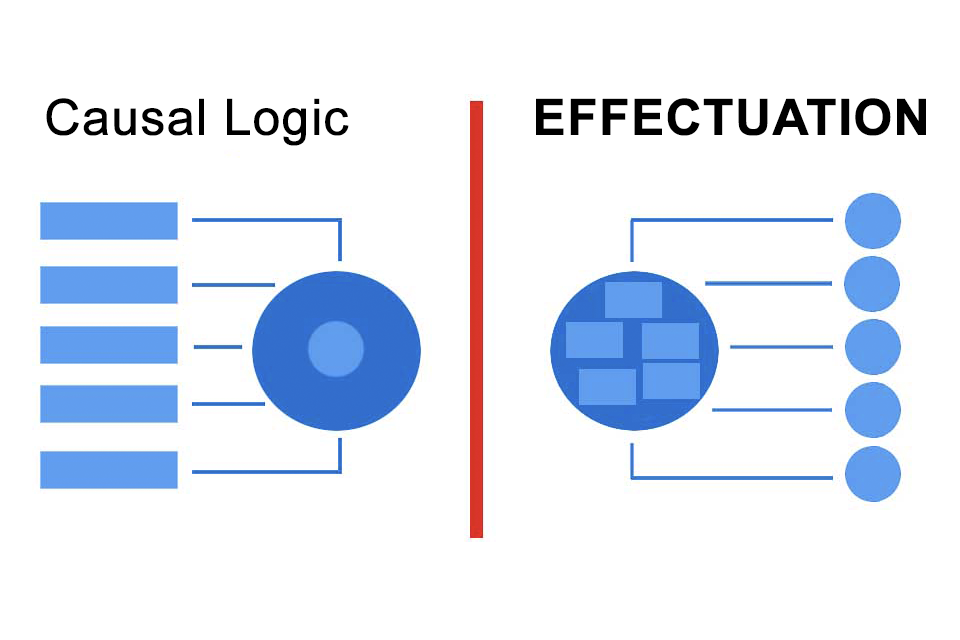What is Effectuation?
Table of Contents: Definition – Principles – Differences to causal logic – Suitability – Questions from the field – Notes
Smartpedia: Effectuation is an independent, non-causal decision-making logic that is used by company founders in situations of uncertainty and insecurity.
Effectuation – decision making in uncertain circumstances
“The best way to predict the future is to create it.” Abraham Lincoln is said to have said.
Effectuation follows this idea as an independent, non-causal decision-making logic that business founders use especially in situations of uncertainty and insecurity.
Situations of uncertainty always occur when resilient forecasts about the future are not possible, whereas situations that can be influenced by control do not need to be predicted. In contrast, causal logic follows the idea that only things that can be controlled can be predicted.
The effectuation approach is a result of global entrepreneurship research under the leadership of Professor Saras D. Sarasvathy. [1] It deals with economic aspects in start-ups of organisations in response to identified market opportunities as well as with entrepreneurs who bear personal capital risk. [2]
Principles of the effectuation method
Effectuation is based on five central principles that differ significantly from the classical causal logic commonly used in many management contexts. While causal logic starts from a defined goal to be achieved with the appropriate resources, effectuation pursues a more flexible, action-oriented approach.
Unexpected events are not seen as disruptions, but as potential opportunities. Competitive thinking is also replaced by cooperative collaboration. The following principles illustrate this difference:
Bird-in-hand principle
What do you do when you don’t yet know exactly what your goal is? You start with what you already have.
Instead of fixating on a future goal, entrepreneurs start with the resources they currently have at their disposal. They ask themselves the following questions:
- Who am I?
- What do I know?
- Who do I know?
These answers give rise to possible courses of action without a fixed goal dictating the path. The focus is on working with existing resources, such as one’s own skills, experience or contacts.
This allows projects to be implemented directly without the need for large initial investments or external resources. In contrast to the goal orientation of causal logic, where a specific goal is defined and then suitable means are sought, effectuation starts with the available resources and develops possible goals from them.
Affordable loss principle
What do you do when the future is unpredictable? You decide based on what you can afford to lose.
Instead of focusing on potential gains, successful entrepreneurs consider how much they could lose in the worst-case scenario without threatening their livelihood. They only invest what they can afford to lose in an emergency. This attitude protects them from taking unnecessary risks and helps them make controlled decisions. Those who only risk what they can afford to lose remain capable of acting in the long term. Unlike causal logic, which is based on expected returns, effectuation is based on what individuals can afford to invest or lose.
Lemonade principle
What do you do when the unexpected happens? You make the best of it.
Unexpected events or surprises are not seen as disruptions, but as new opportunities. Entrepreneurs respond flexibly to change and use such situations to further develop their ideas. Instead of avoiding difficulties, the unplanned is actively incorporated into the process. This results in creative solutions that might never have existed without the unforeseen event. While causal logic attempts to avoid coincidences and disruptions as much as possible, effectuation actively uses these unplannable elements as opportunities.
Crazy quilt principle
What do you do when you cannot manage an undertaking on your own? You think in terms of partnerships and cooperation.
Right at the start of a project, partnerships are formed with people who are willing to get involved despite uncertainties. This collaboration gives rise to new resources and ideas. The direction of a project is developed jointly and not determined solely by competition. Each person involved contributes their own strengths, experience and networks. This creates a diverse and sustainable foundation for further action. In contrast to the competitive thinking of causal logic, which often sees other market participants as rivals, effectuation focuses on early collaboration with partners.
Pilot-in-the-plane principle
What do you do when the future cannot be predicted with certainty? You actively shape it.
The basic idea is that those who can shape the future do not need to predict it. Entrepreneurs focus on what they can actively influence instead of relying on forecasts. They take responsibility for their actions and make decisions based on what is achievable. Just as a pilot steers his plane safely even in uncertain weather, they remain in control even when faced with uncertainty. Instead of relying on predictability and planning, as is common in traditional management logic, effectuation relies on active shaping in the moment and on the influence of one’s own decisions.
These five principles show that entrepreneurial action in the sense of effectuation is not based on fixed plans, but on the use of available resources, the conscious handling of risks, openness to the unexpected, cooperation with others and the active shaping of the future. This creates a flexible and pragmatic alternative to classic management logic.
Differences between causal logic and effectuation
Causal logic is based on the idea that organisations can only plan or control those aspects that can be predicted. And what happens if the basis for a prediction is missing and a plan becomes impossible? Effectuation focuses on things that can be shaped through active action. And what can be shaped is what is based on existing means. The following is a small presentation of the attitude of the two orientations in comparison:
| Causal Logic | Effectuation | |
| Basic Idea | The future is predictable and plannable | The future is not predictable, but it can be influenced |
| Basis for Action | goal-oriented | resource-oriented |
| Risk Orientation | expected return | affordable effort or affordable loss |
| Attitude towards others | competitive | cooperative |
| Attitude to Coincidences | avoid | utilise |
Effectuation, however, is not the opposite of causal logic, it is a complement. It is an approach to actively tackle the feasible. It is not a technique that tells a company founder what he or she has to do. And as soon as it makes sense to design projects with plans and implement them, this should also happen in practice.
When is effectuation particularly well suited?
Effectuation is particularly helpful in situations where uncertainty is high and traditional planning approaches reach their limits. This applies above all to contexts in which:
- the future is difficult to predict, for example in the development of new markets or radical innovations.
- Goals are not yet clearly defined, but take shape and evolve over the course of the process.
- The parameters can be actively shaped through one’s own actions and through cooperation with others.
Effectuation is therefore ideal for start-ups, innovation projects, the development of new business areas or for companies in situations of change, such as crises. Effectuation can also provide valuable impetus in established organisations, especially in areas where uncertainty has to be dealt with. [3] It promotes entrepreneurial thinking, experimentation and the ability to react flexibly to new circumstances.
For effectuation to be effective in existing structures, it often requires support from management, the dismantling of rigid processes and an open corporate culture that allows experimentation. It is important to make a conscious distinction here: not every task requires the same approach to uncertainty. Depending on the situation, the classic causal approach may be the right course of action in some cases, while effectuation may be more appropriate in others.
Questions from the field
Here are some questions and answers from the field:
Why is there sometimes talk of four Effectuation principles and sometimes of five?
The original research by Saras D. Sarasvathy and the majority of current sources identify five central principles:
- Bird-in-Hand (resource orientation): Start with what you have, i.e. who you are, what you know and who you know.
- Affordable Loss: Decide based on what you are willing to lose in the worst case scenario.
- Crazy Quilt (partnerships): Build strategic partnerships early on to share uncertainties.
- Lemonade (seize opportunities): Use unexpected events as opportunities for further development.
- Pilot-in-the-Plane (control in uncertainty): Actively shape the future instead of predicting it.
These five principles are now considered standard and can be found in numerous specialist sources and practical examples.
However, some representations limit themselves to four principles by interpreting the ‘pilot-in-the-plane principle’ as an overarching meta-principle or integrative framework. In such cases, controlling the future is not mentioned as a separate principle, but is implicitly included. For a comprehensive understanding of effectuation, it is recommended to follow the five-principle structure.
Can effectuation be learned?
Effectuation is a method that can be learned and taught. Research by Saras D. Sarasvathy has shown that the thinking and actions of experienced entrepreneurs can be systematically recorded and translated into concrete principles and a comprehensible process. Effectuation can be taught through training courses, specialist literature and video material, enabling people to think entrepreneurially and remain capable of acting in uncertain situations.
What significance do uncertainty and risk have in the effectuation approach?
In the effectuation approach, uncertainty is not seen as a disruptive factor that must be controlled through planning and forecasting. Rather, it is regarded as a normal and malleable reality of entrepreneurial activity. Especially in dynamic and open situations, such as when developing innovations or entering new markets, the future cannot be reliably predicted.
Effectuation counters this unpredictability with a different logic. Instead of asking what profit can be expected, the focus is on how much can be lost in the worst-case scenario without jeopardising one’s livelihood. This focus on affordable loss makes it possible to make decisions and take action even under uncertain conditions.
The approach to risk is not cautious, but consciously designed. Those who only invest what they can afford to lose remain capable of acting even if an undertaking fails. This lowers the threshold for trying new things and promotes an experimental approach to open situations.
Coincidences and unforeseen events are not seen as threats. Rather, they are regarded as valuable opportunities to adjust course, enter into new partnerships or discover alternative paths. In this way, uncertainty is not perceived as a burden, but as a source of creativity, development and entrepreneurial design.
Is effectuation just old wine in new bottles?
At first glance, effectuation may seem like a compilation of well-known entrepreneurial principles. Many of the ways of thinking and acting described in it are indeed not new. Successful entrepreneurs have always intuitively started with limited resources, weighed risks, reacted flexibly to surprises and built strategic partnerships.
What makes effectuation special, however, is the systematic observation and theoretical foundation of precisely this entrepreneurial behaviour. Saras D. Sarasvathy’s research has shown that so-called expert entrepreneurs exhibit clearly recognisable, consistent decision-making behaviour under uncertainty. This logic was first theorised, named with principles and developed into a method that can be taught and learned.
Effectuation is therefore not simply a new term for old behavior, but a structured description of a specific entrepreneurial logic. It deliberately contrasts with classic, causal management logic and offers concrete guidance for situations in which planning, control and prediction reach their limits.
→ Heiko Bartlog provides an interesting answer to these (and other) questions in an interview.
[1] Saras D. Sarasvathy: What makes entrepreneurs entrepreneurial?
[2] Prof. Sarasvathy’s scientific work has received numerous awards, including the Gerald E. Hills Best Paper Award of the American Marketing Association in 2009 and 2015 and the Foundational Paper Award of the Academy of Management in 2017.
[3] The approach is rarely used in markets with well-known products and services; established markets can be strategically planned and forecast, but offer relatively few design and control options.
If you are looking for a great service provider for the topic, we are happy to recommend Heiko Bartlog.
Here you can find an interesting German-language podcast about Effectuation.
Here you can find a German podcast about the interaction of Effectuation and Scrum.
And here you can find additional information from our t2informatik Blog:



